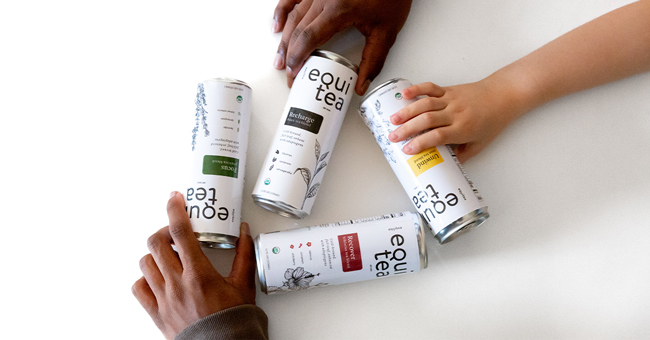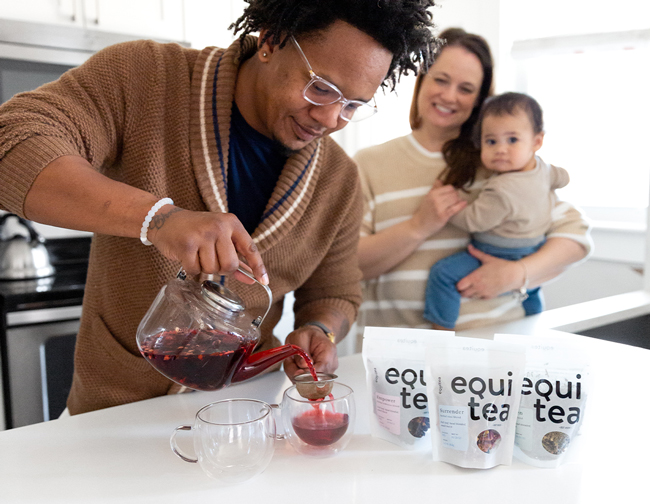
Before he ever saw it as a potential brand or business, Quentin Vennie saw tea as a way to save his life.
Equitea, the Baltimore-based functional RTD tea company Vennie founded is rooted in his struggles with anxiety and depression that ultimately manifested into an addiction to anti-anxiety medication, an accidental overdose and two failed suicide attempts.
After hitting “rock bottom,” the ritual of making and drinking tea became an integral part of Vennie’s recovery. That experience helped pave the way to launch Equitea. Later, when his son Jayden was diagnosed with ADHD, he again looked to tea as a tool for treating the mental health disorder.
“I went out and bought pretty much every variation of green tea that you can think of, and quickly realized that a lot of the bagged teas that were available in retail stores were of low quality, very minimal nutritional value – if any – and tasted horribly,” Vennie said. “And so I went down this rabbit-hole of researching as much as I could about green tea to figure out how do I make green tea palatable to a nine-year-old.”
Vennie began creating loose leaf, green tea blends that helped his son with calm and focus. The first blend mixed green tea leaves with lavender, lemon verbena and lemongrass that became a part of Jayden’s daily routine. That led to more blends for different members of Vennie’s eight-person household, each used to treat everything from insomnia to menstrual cramps. At one point, the family was brewing up to 10 different blends regularly.
That’s when Vennie decided to take his experience running a nonprofit and writing about the mental health and wellness space and apply it to a tea business that he co-founded with wife Erin. Equitea initially launched as a D2C/ecommerce-focused loose leaf tea brand but, after a test run, Vennie found consumers were largely reluctant to brew at home. Towards the end of 2021, the brand pivoted into cold-brewed, RTD products in hopes of making the teas more “easy, accessible, [and] convenient.”

Equitea offers four varieties in 12 oz cans: a green tea blend (Focus), a black tea blend Recharge), hibiscus Recover) and rose-chamomile (UNWIND). Each is enhanced with different adaptogens like ashwagandha, astragalus, and elderberry, sweetened with honey and has an SRP of $3.99.
For now, the brand sells 99% of its tea D2C on its website, but its reach is expanding. Equitea is currently offered at Under Armor’s headquarters as well as at The Dashery Cafe at the Revival Hyatt Hotel in Baltimore. The tea brand is gearing up for distribution in retailers throughout the mid-Atlantic including Whole Foods. Currently, the company reports that 65% of its customer base is located in the Mid-Atlantic region (Maryland, Washington DC, Virginia) as well as northern and southern California.
Equitea also has gained the prominent support of actress and wellness celebrity Gwyneth Paltrow, whose interest in the brand began when she started following Vennie on social media. Paltrow’s interest in Vennie’s work addressing the barriers keeping people of color away from mental health resources sparked a meeting between the two which later developed into a friendship, Vennie said. Three of Equitea’s loose leaf blends are currently offered on Paltrow’s Goop website and the actress has made a personal investment into the brand’s expansion into the RTD space.
“She has been an incredible support and incredible advisor,” he said. “There were a lot of synergies in what she was looking to do personally [and] with what Equitea stands for.”
As the business has scaled and evolved, Vennie has remained outspoken in sharing his and his family’s experience as an example of the positive benefits of his tea. That includes working on a program to offer free cans of Equitea in Baltimore City Public Schools this coming school year.

People of color, primarily Black people, are underrepresented in both the beverage and wellness space, Vennie said, and he thinks there is space to both scale the business into a nationally distributed RTD brand while maintaining its mission of addressing mental health disparities in communities of color.
“Being a Baltimore native myself, I understand the adversities and that a lot of times students and their parents in certain communities feel forgotten,” he said. “When you think about the poverty and the dilapidation in a lot of these communities, they’re not taking an ashwagandha supplement, right? They don’t have the accessibility to go see a therapist every week.”
He continued, “if trauma can be passed down from generation to generation, then so can healing. I’m blessed and fortunate to be in a position before Equitea – but more so with Equitea – to be able to provide that.”